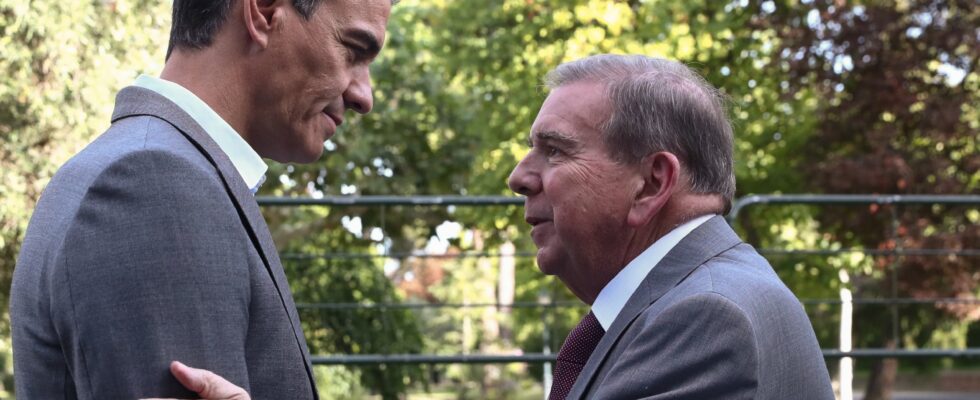The Spanish government has declined to comment, but tensions are palpable between Madrid and Caracas after the Venezuelan government recalled its ambassador to Spain. In a message on social media, Venezuelan Foreign Minister Yvan Gil announced Thursday night that he was recalling his ambassador, Gladys Gutierrez, “for consultations” and that he was summoning the Spanish ambassador to Venezuela, Ramon Santos, to appear at the ministry this Friday, September 13.
The cause: statements by the Spanish Minister of Defense, Margarita Robles, who on Thursday during the presentation of a book described the government of Nicolas Maduro as a “dictatorship” and expressed her solidarity with “the men and women of Venezuela who have had to leave their country.” These remarks are “insolent and crude,” denounced the head of Venezuelan diplomacy, adding that they testified to “a deterioration” of bilateral relations between Caracas and Madrid, where the Venezuelan opponent Edmundo González Urrutia has found refuge since Sunday.
Asked Friday about Venezuela’s decision, Spanish Foreign Minister José Manuel Albares tried to calm things down. “Summoning an ambassador, I have already done it on several occasions, and a recall for consultations, these are sovereign decisions of each state, and therefore, there is nothing to comment on,” he said on public radio RNE. “What I can tell you, however, is that we are working to have the best possible relations with the brother people of Venezuela,” he continued.
This surge in diplomatic fever came as Spanish Prime Minister Pedro Sánchez received Edmundo González Urrutia in Madrid on Thursday, who claims victory in the July 28 presidential election against Nicolas Maduro, who was declared the winner for a third term. “I warmly welcome (him),” the socialist leader said in a message published on X, assuring that Spain would continue “to work for democracy, dialogue and the fundamental rights of the brother people of Venezuela.”
Call to break off “all relationships”
Relations between Madrid and Caracas began to deteriorate on Thursday after a call from the president of the Venezuelan parliament, Jorge Rodriguez, Nicolas Maduro’s campaign leader during the presidential campaign, to break off “all relations” with Spain. Jorge Rodriguez intended to protest against a vote in the Spanish parliament, which on Wednesday adopted a resolution tabled by the Popular Party (PP, right), the main opposition party to Pedro Sánchez, asking Madrid to recognize Edmundo Gonzalez Urrutia as president of Venezuela. This parliamentary proposal has only symbolic value, as only the executive has the power to recognize as president-elect Edmundo González Urrutia, who arrived in Spain on Sunday aboard a Spanish army plane after fleeing Venezuela, where he was the subject of an arrest warrant.
Spain, like all the member states of the European Union, is demanding the full publication of the minutes issued by the polling stations during the presidential election of July 28 – something that the Venezuelan authorities have not done, saying they were the victim of computer hacking. The National Electoral Council (CNE) proclaimed President Nicolas Maduro the winner of this election, with 52% of the vote. But this result is disputed by the opposition, which claims, on the basis of the minutes provided by its scrutineers, that Edmundo Gonzalez Urrutia obtained more than 60% of the vote.
In the absence of complete results, EU countries have so far refused to recognize a winner. This is not the case for the United States, which has decided to recognize Edmundo Gonzalez Urrutia as president, and which announced sanctions on Thursday against 16 associates of Nicolas Maduro, claiming that they had “obstructed” the conduct of the presidential election on July 28. Caracas immediately rejected “with the greatest firmness” measures deemed “illegitimate and illegal” and considered a new “aggression” by Washington.
